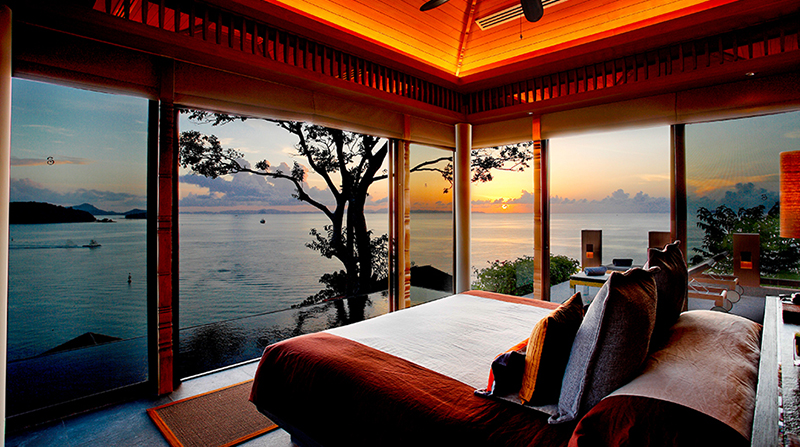

Sri Panwa. Credit: Sri Panwa
When you gaze out from the lost-in-the-cliffs infinity pool at your Sri Panwa villa onto the placid Andaman Sea, Phuket feels like your own private paradise.
The mesmerizing views continue from inside the sleek, sprawling accommodations. A wall of windows lines the living room, bedrooms and even the bathroom, so you can soak in the tub and never lose sight of the vista.
Take in more of the tropical Thai landscape at the hotel’s Baba Poolclub, a nearly 54,000-square-foot indoor/outdoor space. Here, you’ll find most of the property’s restaurants clustered around another striking infinity-edge lap pool. Strategically placed seating areas let you lounge in the middle of the pool with nothing but endless sky and bright aqua water leading off into the horizon.
The island’s splendor envelops you at Baba Nest, a blissful rooftop lounge almost 200 feet above sea level, where you can sit on oversized striped beanbag pillows, sip a refreshing Sri-Jito (lemongrass-infused Belvedere vodka, lemongrass tea, lime and mint) and watch the sun sink in the distance from a 360-degree floating deck circled by yet another infinity pool.
People come for the sunset, but the real treat is the stargazing — you’re so close to the twinkling stars, it almost seems that you can reach out and grab a constellation. If you’re ambitious, wake up to see the sun rise during a relaxing morning yoga session in the convertible space.
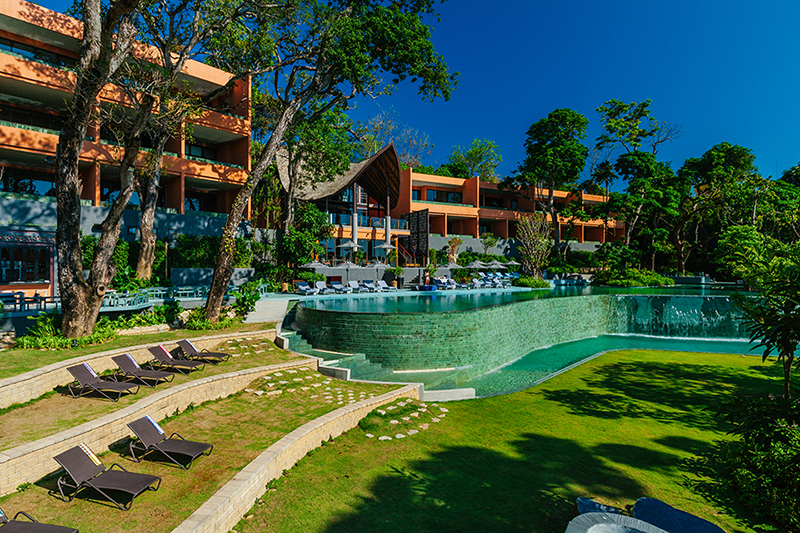
The Habita. Credit: Sri Panwa
An Expanding Boutique Brand
According to the Tourism Authority of Thailand, before a 2004 tsunami devastated Phuket, the number of average international visitors hovered between 2 and 3 million. After the natural disaster, it dropped to 1.3 million. But just a decade and a half later, its tourism is hitting record highs, with 13.6 million international travelers in 2017.
Plus, Thailand’s largest island saw an average of 641,863 passenger arrivals per month in 2017 during the low season, versus 759,703 in the high season, according to C9 Hotelworks’ Phuket Hotel Market Update. The statistics mean that Phuket is now a year-round destination.
Global luxury brands have taken notice and are coming on board — Rosewood opened in November 2017, and Langham plans to debut a Cordis property this year.
Open since 2009, the family-owned Sri Panwa also keeps expanding. The Thai boutique hotel added The Habita to the 40-acre property in 2016. Like the pool villas, The Habita blends into the lush terrain — its lobby resembles an enormous treetop with red cedar shingles forming a leaf-like open-air canopy that frames Cape Panwa, greenery and a curvy Olympic pool with a waterfall. Slate-gray-cushioned rattan armchairs allow you to take in the passing scene.
The Habita’s 10 penthouse suites and 20 pool suites have a similar stylish and modern aesthetic but with a lighter palette — in line with the hotel’s wish to keep its imprint quiet against the island’s scenic beauty. The teak-filled penthouses are made for amorous getaways. Round beds face the floor-to-ceiling windows, allowing for views from all vantage points, while lighting options include “romantic” and “sexy,” and the private pool is nearly bigger than the suite. Even though the accommodations share one building (unlike the freestanding pool villas), each still feels shrouded in solitude.
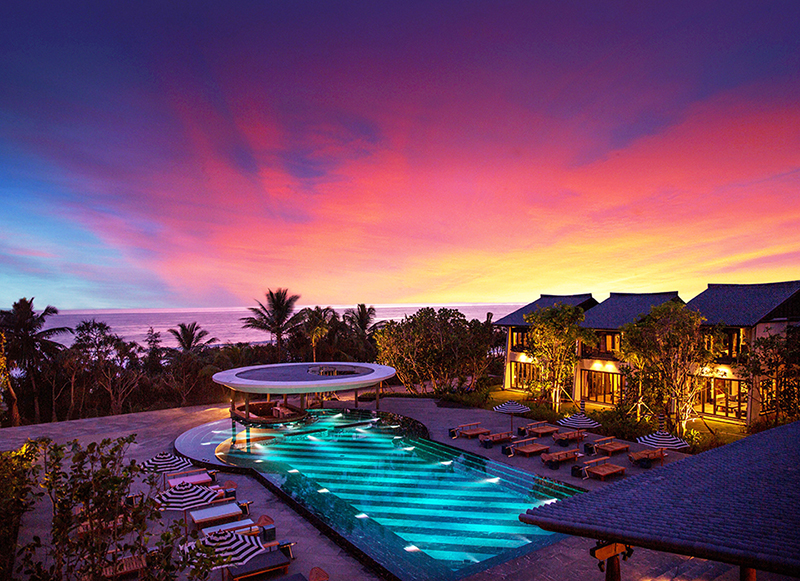
Baba Beach Club. Credit: Baba Beach Club
The antidote to these tranquil escapes is the brand-new Baba Beach Club, a hotel with luxury residences. Set in the northern part of Phuket, Baba Beach Club is the first to open in the less-touristy Khok Kloi and is just 20 minutes from Phuket International Airport.
Instead of sitting along the cliffs, this property sprouts up from the sands of uninhabited Natai Beach. Managing director and owner Vorasit “Wan” Issara calls it “the party spot,” where house music pulses through the property. Baba Beach Club welcomes a slate of visiting DJs, rooms have iPods loaded with tunes and the hotel even maintains its own SoundCloud and Mixcloud channels.
To inject a fun, beachy vibe in the rooms, Baba Beach Club retains a modern, luxe design, but swaps Sri Panwa’s intimate gray and orange palette for fresher hues. You’ll find a lot of white and light wood covering the walls, stone floors and white subway-tiled walls in the bathroom.
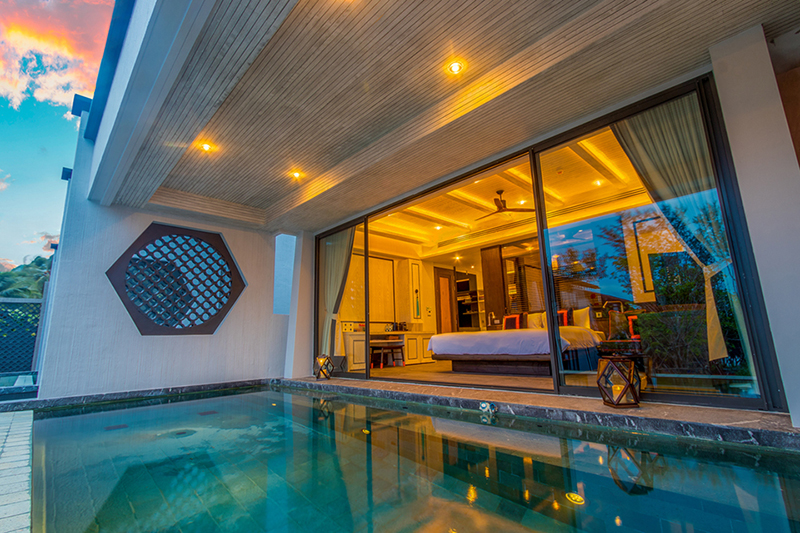
Baba Beach Club’s Ocean View Suite. Credit: Baba Beach Club
The five-bedroom beachfront pool villa is the property’s stunner. The centerpiece is an L-shaped infinity pool that overlooks the ocean. Inside is a full kitchen, a dining room with a long free-form wood table and bathroom tubs roomy enough for three.
Issara isn’t limiting his family’s hotel brand to Phuket. A Baba Beach Club debuted in Hua Hin, a resort town along the Gulf of Thailand, in November 2017. Construction has begun on a Baba Beach Club in Hainan, China, which will be unveiled in the late summer or early fall of 2019. And Issara told us that he’s looking to expand to the U.K. as well.
A Place For Foodies
It’s obvious that young, hip Issara brings his eye for chic, modern design and attentive service to his properties (thanks to his training at places such as Forbes Travel Guide Five-Star Mandarin Oriental, Bangkok). But you also can literally taste his fiery passion for food at his restaurants. Sri Panwa’s breakfast buffet stocks so many Thai specialties, you should ignore the croissants and cheeses in favor of the packed-with-heat crab curry (take a hotel cooking class to learn how to make this thoroughly local dish).
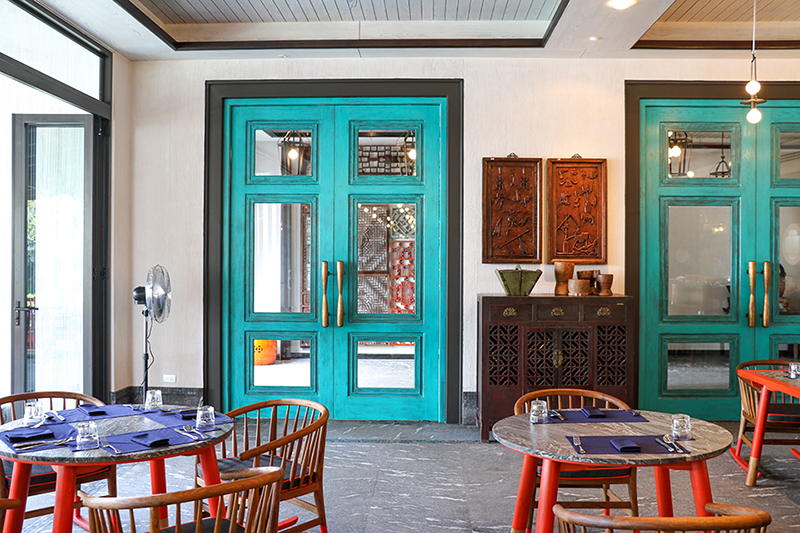
Dining at Baba Beach Club. Credit: Baba Beach Club
We couldn’t get enough of the kanom mun, a subtly sweet gelatinous square sprinkled with shredded coconut, or the kao niew sang ka ya, a luscious pandanus custard over coconut sticky rice.
Even the tiny Baba Hot Box, a grill near The Habita’s communal waterfall pool, doesn’t slouch. Baseball-sized tiger prawns amaze with their sheer proportions, and you’ll be thankful for the extra meat to dunk into delectable sauces like chimichurri, spicy miso and decadent white truffle.
Baba Soul Food specializes in Thai food from the south. Peruse a long list of hot curries — in this region, the dish tends to be more sour and salty than in the north — local fish like grouper and favorites like pad thai with prawns.
Reflecting the Chinese influence on Phuket, Baba Chino serves dim sum, Guangdong-style crispy pigeon and abalone.
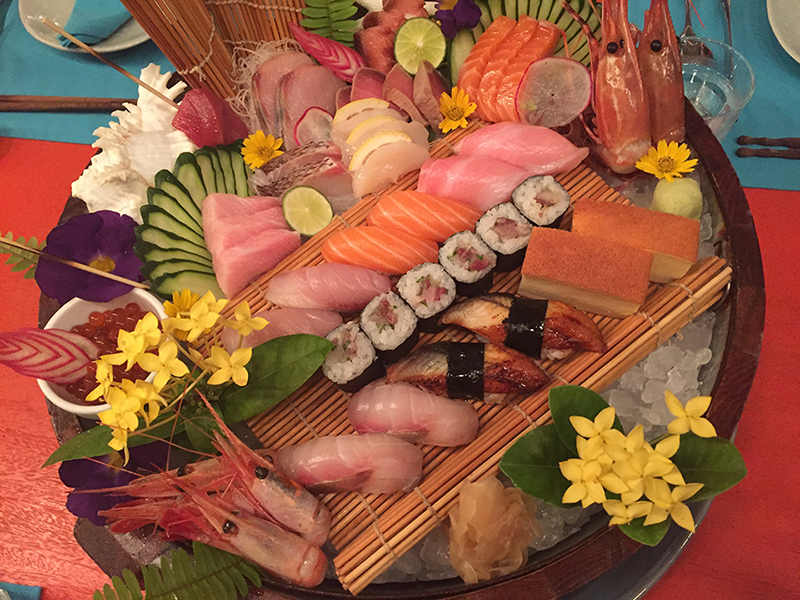
A Sushi Selection from Baba Iki. Credit: Jennifer Kester
Or opt for Baba Iki, where fresh sushi platters arrive in artful presentations that are great fodder for your Instagram feed. The Japanese restaurant also turns out yakitori (skewered meat), teppanyaki and more.
As if all of these dining options weren’t enough, Sri Panwa recently kicked off a series of pop-ups featuring prominent chefs from all over the world, like Stefano Baiocco from Grand Hotel a Villa Feltrinelli in Gargnano, Italy, and Ryujiro Nakamura from Sushi Umi in Tokyo. More pop-ups are planned for the year. The hotel also will host chef Noah Sandoval from Chicago’s Oriole in July as part of the Michelin on the Road dinner series.
The foodie focus also seeps into the spa offerings. Sri Panwa’s Cool Spa has a menu of edible body scrubs, including the detoxifying Tom Yam, with lemongrass, kaffir lime, ginger, galangal, honey and yogurt, and the Somtam, which uses green papaya, carrot, tomato, crushed peanuts, lime and brown sugar to plump up fine lines. We opted for the Mango with Sticky Rice, which buffed our skin and tasted sweet, too. At Sri Panwa, no detail is left aside.
